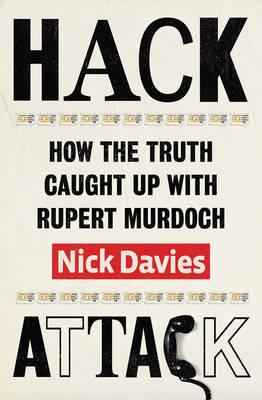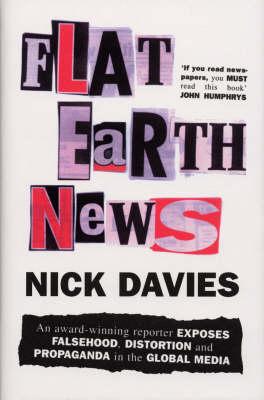 Nick Davies, the author of Hack Attack: How the Truth Caught Up with Rupert Murdoch, was the subject of a Q&A session with Joanna Norris, the editor of The Press, in the chair.
Nick Davies, the author of Hack Attack: How the Truth Caught Up with Rupert Murdoch, was the subject of a Q&A session with Joanna Norris, the editor of The Press, in the chair.
We learned from Joanna Norris' introduction that George Clooney was making a movie based on the book.
When asked about the difficulty of digging deeply into the phone hacking scandal for several years, Davies answered that he had a very reliable source who had guided him through his investigation for over two years. He said it was clear from the outset how extensive the crimes were, but the difficulty was in proving the truth of the story when up against a powerful corporation headed by a ruthless operator like Rupert Murdoch.
All along through the investigation, paradoxically, the impetus was driven by News Corp. itself because the company's staff acted stupidly, arrogantly and aggressively. News Corp. kept up relentless attacks on Davies and The Guardian, which spurred Davies and his editor on to follow the story, knowing it must have substance.
 The ball got rolling when Davies was giving a radio interview about a previous book, Flat Earth News: An Award-Winning Reporter Exposes Falsehood, Distortion and Propaganda in the Global Media. His source was listening to the interview and contacted him about the dodgy dealings that were going on at The Sun and News of the World, both Murdoch tabloid newspapers.
The ball got rolling when Davies was giving a radio interview about a previous book, Flat Earth News: An Award-Winning Reporter Exposes Falsehood, Distortion and Propaganda in the Global Media. His source was listening to the interview and contacted him about the dodgy dealings that were going on at The Sun and News of the World, both Murdoch tabloid newspapers.
When asked if he thought his book had made any difference to the behaviour of the UK press, Davies answered that, unfortunately, it was business as usual. It remained a "journalist's fantasy" that writing about a bad thing could make it stop. He gave, as an example, The Sun conducting a campaign to undermine Labour in the most recent UK election as proof Murdoch's power remained unchanged.
Davies disclosed that he had discovered that UK tabloids were "peculiarly ruthless" and the journalists who staffed them were "almost like a parody of themselves".
It was Davies' belief that it was the arrival of Princess Diana that triggered this avalanche of celebrity investigative digging and bred an attitude of journalistic cruelty where "nothing is off limits, nothing is private". But the tabloid journalists' hypocrisy was astounding. Andy Coulson and Rebecca Brooks were having an eight-year-long affair while callously exposing the sex lives of public figures.
All through the long investigation by The Guardian into the phone hacking scandal, Davies was pilloried in all the right-wing Murdoch newspapers. He observed that no-one threatened him with physical violence to stop investigating, but the Murdoch empire indulges in what Davies called "reputational violence", trying to ruin people's reputations.
Towards the end of the session, in response to questions from the audience, Davies gave the view that the internet had broken the model of newspapers across the world and journalists no longer had the funding nor the resources needed to do their jobs properly.
He thought that the Leveson Enquiry was a powerful one, but Lord Justice Leveson's report had been deliberately smothered by powerful people in the UK.
The audience got the impression that Nick Davies would go on fighting the good fight, but he was weary and cynical as to the extent he could make a change for a better society.


Add a comment to: Hack Attack: WORD Festival Event 12 May 2015